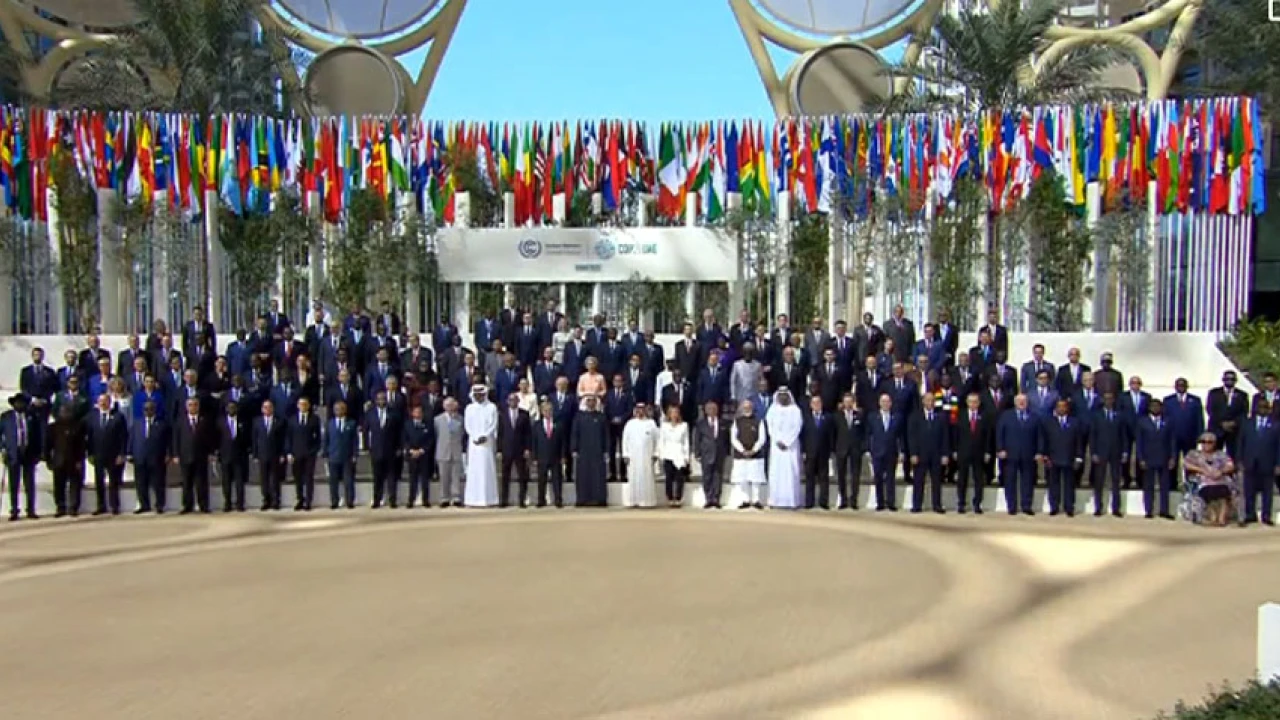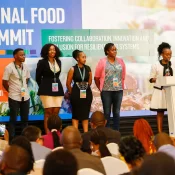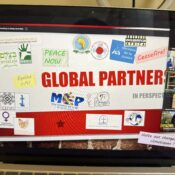
Charting the Climate Landscape: Recap from COP28 and Future Directions
From November 30th to December 12th, COP28 took place in Dubai, bringing the world together to deliberate on climate change—a global issue that affects everyone, transcending regional and socio-economic boundaries. Amidst the discussions, the differentiated impacts of climate change, underscored by principles such as Common but Differentiated Responsibilities and Respective Capabilities (CBDR–RC), and themes of accountability, played a pivotal role.
The Africa Centre for Sustainable and Inclusive Development (Africa CSID) actively participated in and followed COP28, with a particular focus on food and agriculture, health, nature, peace and security, finance, and gender. This overview will delve into key developments in these areas.
A. Declarations and Announcements
Food and Agriculture
The conference commenced on a positive note, witnessing 134 states signing the “Emirates Declaration on Sustainable Agriculture, Resilient Food Systems, and Climate Action”. Subsequently endorsed by over 159 states, the declaration prioritizes vulnerable groups in terms of food security and resilience. It emphasizes transparency, inclusive engagement, accessible finance, and evidence-based actions, with a specific nod to indigenous knowledge. Additionally, there were several announcements and pledges from countries like Brazil, Cambodia, Norway, Rwanda, and Sierra Leone, forming a “High Ambition Coalition Committed to Transforming Food and Land Use Systems”.
Health
Of notable significance is the “Emirates Declaration on Climate and Health”, endorsed by 123 states. This declaration recognizes the holistic approach to human, animal, environmental, and climate health. It emphasizes collaboration with marginalized communities to strengthen climate actions in health and vice versa. Furthermore, it acknowledges the interconnectedness of climate, health, food, and nutrition.
Nature
A significant announcement came in the form of the “COP28 Joint Statement on Climate, Nature, and People”. This statement recognizes the correlation between climate and nature, advocating for collaborative efforts instead of working in isolation. It addresses the need for integration between climate and nature stakeholders, envisioning comprehensive and coherent actions linking Nationally Determined Contributions (NDCs) and National Biodiversity Strategies and Action Plans (NBSAPs). Eighteen states, including four African nations (Arab Republic of Egypt, Republic of Rwanda Republic of Senegal and Republic of Seychelles), signed the agreement.
Peace and Security
In the realm of peace and security, the “COP28 Declaration on Climate, Relief, Recovery, and Peace” garnered support from 82 countries and 10 organizations. This declaration focuses on conflict-sensitive climate finance, enhancing climate resilience, and fostering good practices in conflict-sensitive climate actions. It aims to strengthen coordination, collaboration, and partnerships in climate actions with a conflict-sensitive approach—a crucial step forward, addressing a previously overlooked dimension in mainstream climate discussions. This marked a significant juncture, with global efforts converging to display commitment to comprehensive and integrated approaches, acknowledging the interconnectedness of climate, peace and security in the pursuit of sustainable and resilient solutions to climate change.
Finance
Under finance, a “Leaders’ Declaration on a Global Climate Finance Framework” was introduced. It received limited endorsement, with only 13 states signing, including three African nations (Republic of Ghana, Republic of Kenya, Republic of Senegal). The little interest may stem from the anticipation of a new climate finance commitment by 2025. Another noteworthy financial development was the establishment of the “Taskforce on International Taxation to Enhance Development and Climate Action”—an agreement between Kenya and France aimed at advocating for climate levies on aviation, fossil fuels, and financial transactions. We hope the implementation of these measures will be guided by a human rights approach.
B. Negotiations at COP28
The formal negotiations at COP28 focused on several key areas, including Sharm el-Sheikh joint work on agriculture and food security, loss and damage, Article 6 of the Paris Agreement (emissions and carbon markets), finance, just transition work program, gender action plan, action for climate empowerment, global stock take, rules of procedure, adaptation, mitigation work program, response measures, and gender action plan.
1. Agriculture and Food Security
Of particular interest was the Sharm el-Sheikh joint work on agriculture and food security. Unfortunately, discussions on this topic were deferred to the UNFCCC Subsidiary Body for Implementation (SBI) 60 in June, without clear text. A point of contention in these discussions was the establishment of a coordination group for the joint work, with developing countries favoring this call and developed countries not approving. This joint work was a greed in November 2027 during COP27, and spans a four-year program.
2. Loss and Damage
Addressing loss and damage, defined as unstoppable economic and non-economic harm caused by climate change, including extreme weather events and slow-onset events leading to ecosystem damages, was a focal point. The ongoing discussions over the years have witnessed developed countries resisting the compensation approach, which advocates for them to compensate those disproportionately affected by climate change due to the historical emissions of developed nations.
A significant breakthrough occurred on the first day of the conference when consensus was reached on establishing a loss and damage fund, with various countries pledging their support. However, some nations, such as the UK, reiterated their support commitments, deviating from the requirement for new and additional funding as per climate finance principles. The total pledges for loss and damage amounted to USD 770 million. However, this falls short of the scale of loss and damage globally. Hopes are pinned on the funding growing at a substantial pace, recognizing that starting from USD 770 million is just the beginning. Notably, large emitters are not obligated to contribute to the fund; rather, their participation is contingent on voluntary generosity, shaping the fund as more of a charitable endeavor.
An encouraging outcome was the establishment of the Warsaw International Mechanism for Loss and Damage associated with Climate Change Impacts (WIM). This mechanism aims to facilitate the implementation of strategies addressing loss and damage. Additionally, parties agreed that the Santiago network under the Warsaw International Mechanism for Loss and Damage would be hosted by the UNDRR and UNOPS. The specific country to host the network is to be decided. This network is designed to assist developing countries in preventing, minimizing, and addressing loss and damage caused by climate change by providing technical support and building the capacity of these nations.
3. Adaptation
Concerning adaptation, the focus was on the Global Goal on Adaptation (GGA) and National Adaptation Plans (NAPs). The GGA outlined specific themes, including water, food, health, ecosystems, infrastructure, poverty eradication, and cultural heritage. Notably, peace and security were absent from this list despite their correlation with conflict, adaptation, and community resilience. The NAPs discussion was deferred to the future.
4. Global Stock Takes
COP28 witnessed the first-ever global stock takes under the Paris Agreement, covering mitigation, adaptation, means of implementation and support, loss and damage, and response measures. The decision’s mitigation section calls for limiting greenhouse gas emissions, a notable emphasis on the transition from fossil fuels in the mitigation section. However, there is a concern about the absence of food systems in the mitigation discussion. The decision’s adaptation section is comprehensive, encompassing multi-sectoral and transboundary solutions, ocean-based adaptation, resilience measures, and more. Noteworthy is the emphasis on gender-responsive participatory approaches, early warning systems, and coordination structures. The absence of peace and conflict in this section remains noteworthy, mirroring its omission in the outlined themes of the GGA.
5. Finance
Climate finance discussions often center on the dichotomy between the Global South (developing countries) and the Global North (developed countries), reflecting varying responsibilities for causing and experiencing the impacts of climate change. The commitment made at COP15 in Copenhagen in 2009, where developed countries pledged to jointly mobilize USD 100 billion annually by 2020 for the needs of developing countries, remains unfulfilled. Recognizing this, both developing and developed nations are working on a new finance goal known as the New Collective Quantified Goal (NCQG), slated for implementation post-2025. This new arrangement is likely to broaden the donor base, potentially including countries like China and the UAE, the latter having recently pledged funding to the Loss and Damage Fund at COP28. Anticipation builds for COP29, where finance discussions are expected to take center stage in developing the NCQG.
6. Justice Perspectives in Climate Action
The pursuit of effective and efficient climate action necessitates a consideration of justice perspectives. The evolving discussions on the Just Transition Work Programme agenda revealed differing viewpoints, with developing countries calling for support extending beyond financial aid to include addressing patent and license restrictions, as well as exploring punitive tax and trade measures. The outcome of these discussions remains uncertain, and the hope is that the rights of marginalized communities, particularly in terms of geographic location and population context, will be prioritized in subsequent actions.
7. Gender Action Plan Challenges
The Gender Action Plan, launched in COP25, aims to integrate gender-responsive thinking and policy across UNFCCC negotiations. However, during COP28, negotiators faced challenges in reaching a consensus on the definition of gender. The tendency to equate gender with biological sex among negotiators, despite their expertise, may complicate the implementation and reporting of the action plan. Clarification on this front will be crucial to ensure the effective advancement of gender mainstreaming in climate discussions.
8. Action for Climate Empowerment (ACE)
Recognizing the importance of involving every individual in climate action, ACE serves as a critical component. It advocates for education, training, global cooperation, public awareness, participation, and access to information. However, discussions on ACE were suspended until the Bonn talks in June 2024, primarily due to disagreements over the need for financial support to implement these actions. The resolution of this issue will be vital for fostering a comprehensive and inclusive approach to climate empowerment.
We look forward to the implementation of the agreed-upon texts and express the hope that states will uphold their pledges while considering additional commitments in accordance with the principles of Common but Differentiated Responsibility and Respective Capabilities. The long-overdue integration of food systems, health, peace and security, and nature, coupled with a rights-based approach in climate action, marks a significant step forward. We look forward to the consideration of these elements in all future negotiations and implementations, fostering a comprehensive and inclusive approach to addressing climate challenges.
Photo Courtesy of GNN Media



